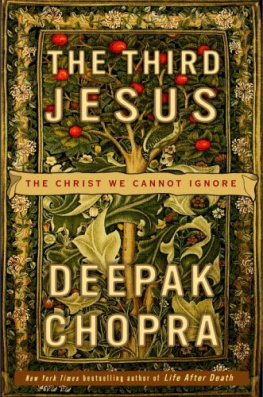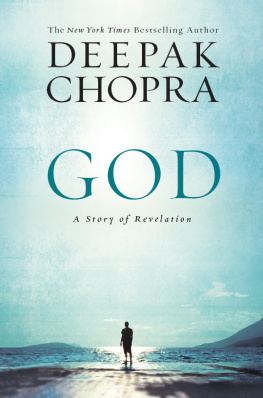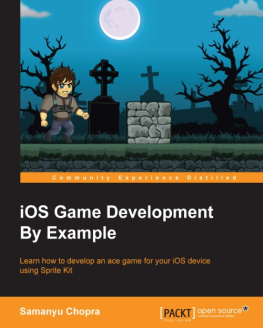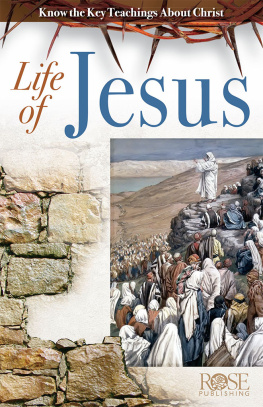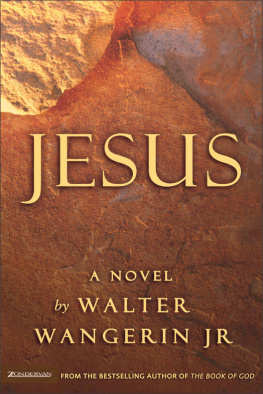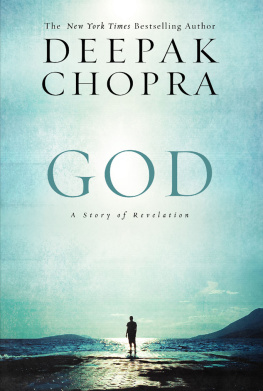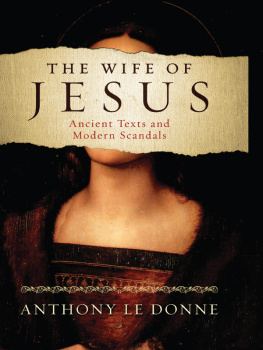

CONTENTS

Part One
THE THIRD JESUS
Part Two
THE GOSPEL OF ENLIGHTENMENT
Part Three
TAKING JESUS AS YOUR TEACHER: A GUIDE FOR SEEKERS
To the Irish Christian Brothers in India
who introduced me to Jesus when I was a little boy
INTRODUCTION
Jesus Christ left behind a riddle that two thousand years of worship havent solved. The riddle can be stated in one sentence: Why are Jesuss teachings impossible to live by? It would startle millions of Christians to hear that this riddle exists. They try to live by Jesuss words every day. They love, pray, show compassion, and practice charity in his name. Yet these humane and worthy actions, which reveal a good heart intent on serving God, do not fulfill Jesuss deeper mandate.
What Jesus actually taught is much more radical and at the same time mystical. When I was a child in India, I first heard about the Golden Rule from the Christian brothers who had traveled from Ireland to run our school. This basic tenet of Christianity, which comes from Matthew 7:12, is simple enough to teach even to small children: Do unto others as you would have them do unto you. So where is the riddle? What could possibly be considered radical or mystical here?
Taken literally, the Golden Rule requires you to treat an enemy as an equal, which means in essence that you can have no enemies. Jesus didnt say, Pick the easiest people and treat them nicely, just as youd like to be treated. That might be the Gilded Rule, which is what the Golden Rule became once people realized that Jesuss teaching couldnt be reconciled with human nature. Its human nature to love those who love us in return, not those who hate us. Its human nature to fight back when attacked (this violates another basic but impossible tenet of Jesuss: Resist not evil). But Jesus makes no such allowances. Many of Jesuss most famous words defy human nature in this way. Turn the other cheek. Love thy neighbor as thyself.
If Jesuss words are too radical to live by, was that his intention? Or have we misunderstood a spiritual teacher who seems to be so clear, simple, and direct? I propose that both have occurred. Jesus intended a completely new view of human nature, and unless you transform yourself, you misunderstand what he had to say. You can struggle your entire life to be a good Christian without succeeding in doing what Jesus explicitly wanted.
He wanted to inspire a world reborn in God. This vision is breathtaking in its ambition. It points us toward a mystical realm, the only place where human nature can radically change. At the level of the soul we find out how to love our neighbors as ourselves, we are able to remove the obstacles that keep us from doing unto others as we would want them to do unto us. Jesuss name for the realm of the soul is the Kingdom of God, and he clearly intended for it to descend to earth. (On earth let it be as it is in Heaven.) God was to replace Caesar as the ruler of human affairs, and all the conditions that applied to material existence would change. Jesus could not have been more direct when he said that total transformation was near. This was perhaps the first and most important message he wanted to deliver: From the time Jesus began to preach, he said, Repent, for the Kingdom of Heaven is at hand. (Matthew 4:17)
Yet Jesus failed to bring about Gods rule on earth, and his radical vision became compromised only a generation after his death, at the same time that early Christianity was spreading with startling speed and intensity. The disciples who had followed him knew without a doubt that they had met someone of earthshaking significance. What the disciples didnt talk about so fervently was the shadow side of their new faith. They were struggling to live as Jesus wanted them to, and in many respects they were failing. They fought for power among themselves and squabbled over doctrine. They had doubts, and fears of persecution. Jealousy and sexual desire made their age-old claims. Such basic matters as whether to follow Peter or Paul as chief spokesman for Jesus drove Christians apart.
The early Church was rife with disputes and conflicts, just like every other faith that had come before. To emerge from this chaos, to survive as followers of the Messiah, was a life-and-death challenge. As a result, Christianity was forced to compromise Jesuss vision: The alternativea complete transformation of human naturewas proving impossible. Those few who could achieve it became known as saints, and they were far removed from the dirty, bustling world and its corrupt ways.
In this book, I argue that Jesuss vision isnt impossible to realize. Yes, it is radical and mystical. None of that has changed. But the underlying dilemmahow to live as Jesus wanted us tocan be resolved. In fact, it must be resolved if Jesus is to have any kind of meaningful future. In order to find the answer to the Jesus riddle, we must begin with radical surgery, cutting through the timeworn Jesus that all of us know (even those, like me, who were not raised in the Church). That traditional version of Jesus was constructed as a compromise; it accepts the essential failure of Christs vision, so we must go beyond it.
Jesus did not physically descend from Gods dwelling place above the clouds, nor did he return to sit at the right hand of a literal throne. What made Jesus the Son of God was the fact that he had achieved God-consciousness. Jesus said as much, over and over, when he declared that the Father and I are one. He knew no separation between his thoughts and Gods thoughts, his feelings and Gods feelings, his actions and the actions God wanted performed. I realize that I am quoting the most basic of Jesuss words, but we have no choice but to start at the beginning. Radical comes from the Latin word radix, or root. Jesus the radical went to the root of the human condition, and his approach to suffering was to eradicate it, literally to tear it out by the root.
But my attachment to Jesus is more personal, too. It dates from my childhood, when I heard Christian prayers at the Catholic school I attended and Vedic chants at home. I was encouraged to respect every faith, which wasnt a sterile duty but more like a festive delight. In my circle of friends one could run over to a Christian house for Christmas without feeling strange, just as we ran to a Muslim or Parsi house for their feasts and holy observances. I grew up in the early Fifties, and it would be naive to call that an innocent time in India. Hundreds of thousands of Hindus and Muslims suffered and died in the partition of India and Pakistan after liberation from the British in 1947. As one of Indias children of midnight (so called because the modern nation of India was born at the stroke of midnight, August 15, 1947), I lived on the cusp between idealism and violence.
Now, sixty years later, the world is changing again, rapidly and with tremendous confusion. In the ferment of change there resides an opening for Jesuss radical vision to be renewed. Spirit, like water, remains fresh only if it flows.
I have written what I think the New Testament actually means, astonishing things stated in plain words. No one is an outsider who wishes to make Jesus central to his or her spiritual path, and no one should pay lip service to Jesuss words while guilt, pain, and suffering continue to go unhealed.
Part One

Next page
